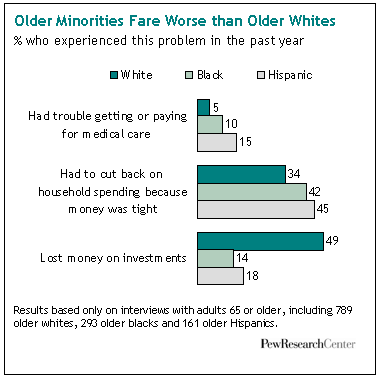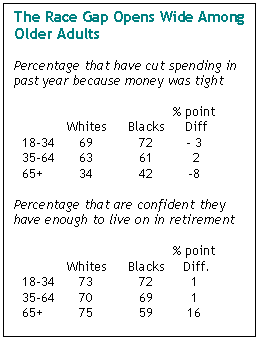
Among older adults, different demographic groups have fared better financially than others in the past year. For example, more than four-in-ten older blacks and Hispanics but only about a third of whites 65 or older report they have trimmed household spending because money was tight.
Similarly, 15% of older Hispanics and 10% of older blacks say they had trouble getting or paying for medical care, compared with 5% of whites 65 and older. At the same time, nearly half of all older whites (49%) say the have lost money on investments, roughly three times the proportion of blacks (14%) and Hispanics (18%) — a finding that no doubt reflects the considerable differences in ownership of stocks, bonds and other financial assets among different racial and ethnic groups, irrespective of age.
The Race Gap Widest Among Older Adults

The race gap on some key questions is greater among older adults than it is among Americans younger than 65. For example, the big difference in the proportion of older blacks and whites who have cut household spending in the past year disappears among these younger adults. Virtually identical proportions of younger whites (65%), blacks (65%) and Hispanics (64%) say they have trimmed spending because money was tight.
A similar pattern emerges when respondents were asked if they are confident they have enough income and assets to take care of their financial needs in retirement: 71% of whites younger than 65 and 70% of blacks say they do. But among whites and blacks 65 or older, the gap swells to 16 points. The same pattern plays out between whites and Hispanics: The gap is 1 percentage point among younger Hispanics and younger whites but 13 points among Latinos and whites ages 65 or older.
Even when that younger age group is divided into two groups — 18 to 34 and 35 to 64 — the overall pattern remains: Big differences exist by race among older adults but there are no statistically significant differences by race in any of the younger groups.
Income, Age and the Race Gap
These racial differences among older Americans are due, in part, to income disparities. In fact, nearly half of all older Hispanics (48%) and nearly as many older blacks (43%) have family incomes of less than $20,000 a year, compared with just 28% of whites. Not surprisingly, Americans who earn less have been harder hit by the recession than wealthier adults, and this pattern holds among older Americans as well. What is different is that older minorities are significantly more likely than younger minorities to fall into the lowest income group.
Overall, nearly six-in-ten adults 65 or older with family incomes of less than $20,000 say they have cut back spending in the past year, more than double the proportion of older adults with incomes of $50,000 or more (57% vs. 22%). Significantly, older minorities are even more likely than younger minorities to have family incomes that put them in the lowest-income group. For example, 43% of older blacks have family incomes of less than $20,000, compared with 27% of blacks younger than 65. Among older Hispanics, nearly half (48%) earn less than $20,000, compared with 30% of younger Hispanics. (In contrast, 28% of older whites and 14% of younger whites have similarly low incomes.)
Still, low-income older adults are better off on this measure than other lower-earning Americans; among those younger than 65, eight-in-ten report they have been forced to trim back household spending in the past year. That’s fully 20 percentage points higher than the proportion of lower-income seniors.
Even with Medicare and Medicaid, older adults with incomes of less than $20,000 are three times as likely as those with incomes between $20,000 and $50,000 to report problems getting or paying for medical care (15% vs. 5%). An even smaller proportion (2%) of seniors with family income of $50,000 or more have similar problems with medical care.
However, older Americans with higher incomes regardless of race have not escaped all of the effects of the recession. Among those 65 or older who have retired, those with higher family incomes are more likely than those with lower incomes to have seen their retirement income decline in the past year (36% vs. 20%). In large part, this is because more higher-earning adults in general are the most likely to hold investments affected by the steep decline in the stock market.




